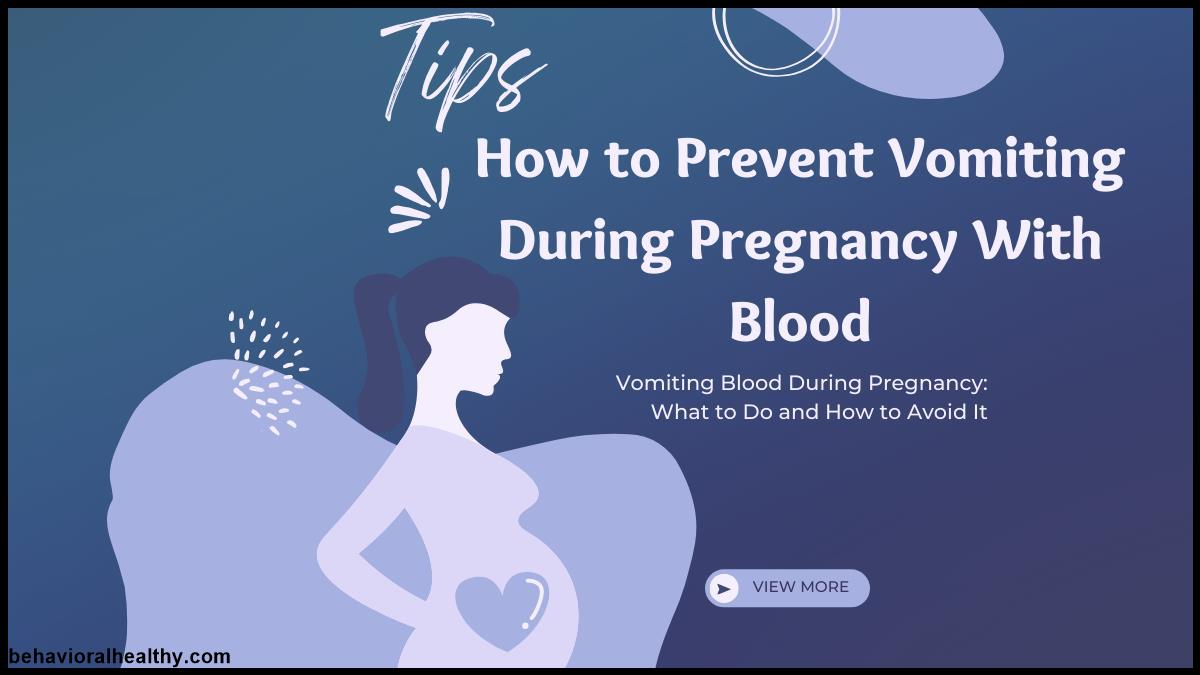Vomiting during pregnancy with blood sounds scary, but knowing the potential causes and what you need to do can ease panic.
Table of Contents
Vomiting Blood During Pregnancy: What to Do and How to Avoid It
Pregnancy can be an exhilarating time, but it comes with its own set of challenges as well. Morning sickness and nausea are usual in pregnancy, but what does it mean when you experience vomiting during pregnancy with blood? It will be shocking, right? In this blog, let’s discuss what to do and how you can avoid it.
What Causes Vomiting with Blood During Pregnancy?
Nausea and vomiting during pregnancy with blood are common problems, particularly in the first trimester, and are related to hormonal changes. But vomiting with blood is not normal and may cause a more serious condition. It’s important to know the possible reasons and when you need to see a doctor.
- Hyperemesis Gravidarum (Extreme Morning Sickness)
Hyperemesis gravidarum is extreme morning sickness. It can also lead to severe vomiting and dehydration. In extreme cases, it triggers small tears in the esophagus called Mallory-Weiss tears, which can cause bloody vomit. This condition is life-threatening and requires medical attention.
Gastric Irritation or Ulcers
Hormones during pregnancy, especially progesterone, relax muscles throughout the stomach and digestive tract. This relaxation could result in acid reflux, or even gastric ulcers, which could result in vomiting with blood. If you have certain digestive conditions like acid reflux or ulcers, know the risks and monitor symptoms quickly.
What to Do If You Vomit Blood During Pregnancy
If you experience vomiting during pregnancy with blood, it is important to take action straight away and not panic. Here’s what you should do:
- Get Medical Attention Immediately
Any instance of vomiting blood should be assessed by a medical professional immediately. You should call your doctor or go to the emergency room. Blood in vomit may signify a serious underlying condition that requires immediate management.
Monitor the Amount of Blood
If the blood is in small amounts, it may simply be from minor tears or irritation of the esophagus. But if you’re vomiting large quantities of blood, it is important that you get emergency medical care right away, as this may indicate a more serious problem.
Stay Hydrated
Vomiting with blood can cause dehydration. Be sure to drink water slowly to rehydrate your body. If you can’t keep fluids down, consult a doctor about options for being rehydrated, including IV fluids or oral rehydration solutions.
Avoid Further Vomiting
For continuous vomiting, take rest and avoid triggers. Stay away from strong scents or some foods that may cause nausea. Avoid further irritation to your stomach by eating small and easily digestible meals.
- Consult Your Doctor’s Advice
Your health provider will advise appropriate treatment, including whether you might need prophylaxis for nausea, proton pump inhibitors to reduce stomach acid, hydration, and rest. That’s why following your doctor’s guidance is essential to managing your symptoms successfully.
How to Prevent Vomiting with Blood in Pregnancy
Although preventing vomiting in pregnancy is not always possible, there are different methods you can use to help reduce the chances of vomiting with blood.
- Manage Nausea Effectively
The most effective way to prevent blood vomit is to address nausea as soon as it hits. Eat small, frequent meals, and stay away from oily, spicy, or highly acidic foods. Have crackers or ginger-based snacks handy to help keep nausea at bay. It’s also important to drink plenty of water and stay hydrated.
Talk to Your Doctor About Severe Morning Sickness
If you have severe nausea or vomiting, ask your doctor about treatment options. They might prescribe anti-nausea medications, intravenous fluids, or hospitalization, in severe cases, to ensure you don’t dehydrate.
Avoid Acid Reflux Triggers
If you have a previous history of acid reflux or ulcers, control these conditions appropriately. Taking medications as prescribed, eating smaller meals, and not lying down after eating to keep stomach acid from coming back up into the esophagus.
Take Prenatal Vitamins with Food
Prenatal vitamins are another essential during pregnancy, but taking them on an empty stomach may cause nausea/vomiting. Take them with food to minimise irritation to your stomach lining.
Maintain Good Digestive Health
Eat high fiber, low processed foods. This aids healthy digestion and lowers the risk of disorders such as acid reflux or constipation, which may cause vomiting.
Monitor Your Stress Levels
Stress can also worsen nausea and vomiting during pregnancy. You can practice relaxation techniques such as deep breathing, meditation, or prenatal yoga to reduce stress and anxiety.
When to Seek Help
Although occasional vomiting in pregnancy is common, vomiting with blood is not. Always ask your doctor about this symptom, especially if it is severe or accompanied by other worrying signs, such as:
- Severe vomiting causing dehydration
- Severe abdominal pain
- Fever
- Dizziness or fainting
- Black, tarry stools (a sign of gastrointestinal bleeding)
Final Words
Vomiting during pregnancy with blood sounds scary, but knowing the potential causes and what you need to do can ease panic and help you take the right action. Always consult a physician if you experience this symptom to prevent any serious health conditions. Though vomiting in pregnancy is common, blood in vomit should never be overlooked. A healthy pregnancy requires close work with your health care provider to manage nausea and prevent complications for a healthier pregnancy.

